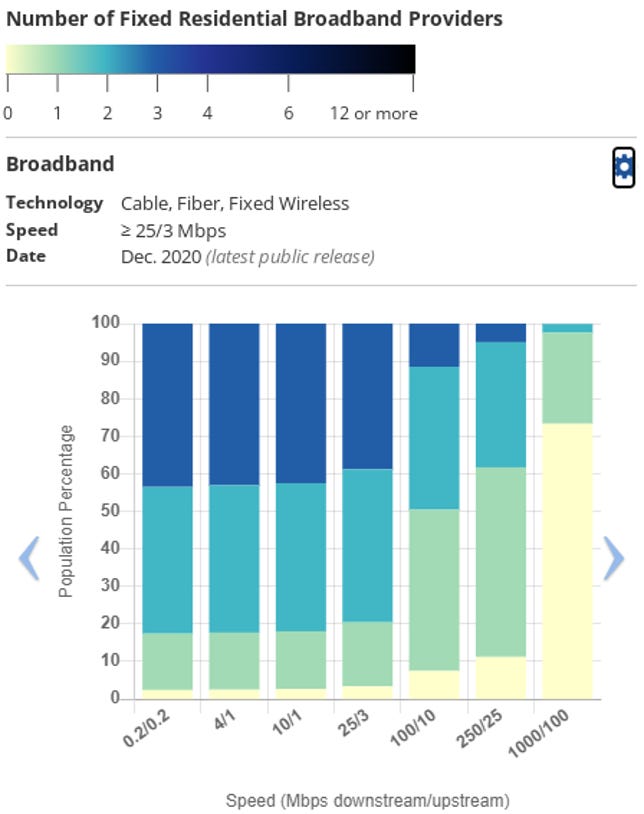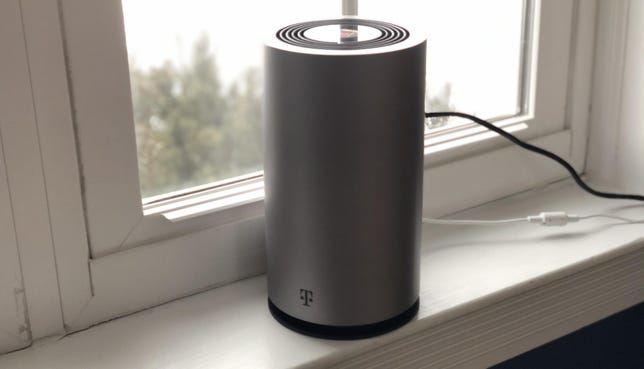Internet for Apartments: Know Your Options and Your Needs
[ad_1]

Getty Images
Living in an apartment has its advantages. Aside from reasonable availability in an increasingly tough market for potential home buyers, many of the hassles that come with home ownership like mowing, appliance repair and garbage collection are taken care of for you. You’ll likely still have the responsibility of setting up utilities, though, and that includes your internet connection.
Finding the best internet provider for your apartment can be tricky, but it’s worth the effort to ensure you get a service that fits your needs and your budget. I’ll break down everything you need to know about internet service for an apartment, from understanding what the internet options are in your area to finding the right plan, setting up your equipment and keeping your connection secure.
Understanding your apartment internet options
Before moving into a new apartment, ask the leasing office or property owner about your internet options. It’s possible they’ll say Wi-Fi is included with your rent, but don’t count on it. What’s more likely is that they’ll tell you that “X provider” is the sole ISP for the building. Be skeptical of that statement — your apartment’s location may present more internet options than the owner is letting on.
It’s no secret that apartment owners tend to favor a particular internet provider, either for convenience or to cut costs, or both. But the FCC banned the practice of owners making exclusive agreements with ISPs back in 2008, and recently took further measures to increase competition in apartment buildings, so ISP exclusivity in apartment buildings is not as common as it once was.
The newest FCC ruling, passed in February 2022, prohibits revenue sharing between owners and ISPs and requires owners to disclose the existence of exclusive marketing arrangements in order to “promote tenant choice and competition in the provision of communications services” for those living in apartments.
So I can get any internet service I want in my apartment?
Not necessarily. There’s still the matter of which ISPs offer service in your area and which ones actually run service to your building. Owners can’t enter exclusive agreements with ISPs, nor can they take part in revenue sharing by favoring one provider over another, but they still have an influence over which providers can run service lines to and through the building, such as a single cable or fiber provider.
That means it’s possible that your building is only wired for one type of internet service, which will obviously limit your choices. You may be able to have a new line from a different provider run to your apartment, but you’ll want to check with your leasing office or owner first. Installing a new cable line or fiber connection will require drilling and possibly mounting new boxes on the building’s exterior, which may not be permitted in your lease. On that note, satellite dishes are typically not allowed at apartments, so don’t expect satellite internet to be an option, either.

Nearly 50% of the US population has two or more internet options with speeds of 100Mbps or higher from cable, fiber and fixed wireless ISPs.
FCC/Mapbox
Cable, fiber, fixed wireless and 5G are best for apartments
A cable connection is your best bet when it comes to internet service in an apartment, as cable internet is available in more than 97% of urban areas, according to the FCC. That means your apartment building is probably already equipped to run internet and TV service from a major cable provider like Xfinity, Spectrum, Cox or Mediacom, or perhaps a regional cable company.
For the most part, cable internet offers fast download speeds, up to a gig or higher, and competitive rates. It’s still a good idea to see what else may be available, however, before settling on cable internet service. Fiber-optic internet, for example, comes with the potential for faster, more reliable speeds (including significantly faster upload speeds), and it often has lower pricing than cable, especially when you consider the cost per Mbps.
At just under 50% coverage in urban areas, fiber-optic service from providers such as AT&T, CenturyLink, Frontier and Verizon is your second most probable option for internet in an apartment. If it’s not available in your apartment but you’re fairly sure there’s a fiber provider in your area, consider speaking with your leasing office or landlord about what it would take to get fiber internet in your building — the speed and value that comes with fiber is worth the effort.
In addition to cable and possibly fiber internet, fixed wireless internet, from providers like Google Fiber and Starry Internet, may also be an option for your apartment. This internet type involves installing a receiver to the roof which then disperses service throughout the entire building, so you won’t be able to sign up for fixed wireless service unless the building is specifically equipped for it.
On the other hand, 5G home internet service from T-Mobile or Verizon may be available in your area and doesn’t require any special installation or mounting of equipment, so you shouldn’t need approval or cooperation from the building’s owner before signing up. The disadvantage to 5G home internet is that you can only get whatever speeds are available in your area, which in the case of T-Mobile, could be anywhere from 35 to 115Mbps — well below the speed potential you’ll get with cable, fiber or even fixed wireless service.
Best internet for apartments
| Connection type | Monthly price range | Download speed range | Top providers |
|---|---|---|---|
| 5G Home Internet | $50 to $70 | 35 to 980Mbps | T-Mobile, Verizon |
| Cable | $20 to $110 | 25 to 1,200Mbps | Astound, Cox, Mediacom, Optimum, Spectrum, Xfinity |
| Fiber-optic | $20 to $300 | 50 to 5,000Mbps | AT&T, CenturyLink, Frontier, Google Fiber, Verizon Fios, Ziply Fiber |
| Fixed wireless | $30 to $100 | 50 to 1,000Mbps | Google Fiber (Webpass), Starry Internet |
Choosing the right internet plan for your apartment
What internet speed do you need for your apartment? That’ll depend on a few factors, such as how many people live in the apartment, how many connected devices you have and what you use the internet for.
If living solo in a single bedroom apartment, 100Mbps will probably suffice for streaming, online gaming and working remotely. Netflix, for example, recommends speeds of 25Mbps for streaming in 4K, and the FCC suggests speeds of only 4Mbps for online multiplayer games.
So why would I recommend 100Mbps if you can stream in 4K with 25Mbps and game online with a mere 4Mbps? Because using Wi-Fi slows your speeds, as does connecting multiple devices at once, like your phone, computer, smart TV and gaming console. Network congestion during peak usage times can also slow speeds, especially on a cable internet connection, which is a real possibility in an apartment when you have potentially hundreds of people living around you using the same internet service. So even though your plan comes with max advertised speeds of 100Mbps, what you’re actually getting to a particular device may be significantly lower.
For larger apartments with families or roommates, you may want to consider bumping up to a faster speed in the 200-500Mbps range. There may be faster speeds available — most cable and fiber ISPs offer a gigabit speed tier — but that’s likely going to be overkill, and overpriced, for your needs in an apartment.
The average single bedroom apartment is less than 800 square feet, according to Statista. There are only so many users and devices you can have in such a space, and speeds of 100 to 500Mbps will almost assuredly support them all. That said, if you want an uncompromising connection for serious streaming, gaming or remote work and you don’t mind paying a little more, a gigabit connection will ensure you’ve got plenty of speed for all your needs.

For the best wireless connection, place your router in a central spot that’s as high up and unobstructed by physical barriers and other electronic devices as possible.
Rick Broida/CNET
Setting up internet equipment in your apartment
When placed strategically, an average Wi-Fi router will cover a roughly 1,200-square-foot space, or about the size of a large three bedroom apartment. For the best signal quality and speed reliability, place your router in a central location in your apartment, ideally elevated and free from obstructions like a TV or wall. Additionally, try to place your router away from the microwave, cordless phones or other devices that emit radio signals that could interfere with the router’s signal.
If you need a little more coverage or notice speeds are spotty in certain parts of your apartment, you may want to add a Wi-Fi extender to your network, or upgrade your Wi-Fi router altogether. ISPs will often allow you to use your own Wi-Fi router and potentially save on monthly equipment costs.
Others, including AT&T, Frontier and Spectrum, include some or all of the Wi-Fi equipment for your apartment at no extra cost (Spectrum includes a free modem, though router rental is an extra $5), so there’s no need to invest in a Wi-Fi router if the one from your provider suits your needs.
Keeping your apartment internet connection secure
Living in an apartment typically means sharing walls with neighbors immediately above, below, to the left and to the right of you. A good Wi-Fi signal will permeate those walls, potentially sending your internet service into someone else’s space, so you want to make sure your connection is password-protected with a strong passphrase.
You’ll also want to keep occasional tabs on the devices that are connected to your network. Most ISPs and Wi-Fi routers have an app that allows you to easily access your equipment settings and view all connected devices. Some of those apps might also offer notifications whenever a new device joins your network. If anything ever looks suspicious, change your password and reset the router. You’ll have to login from all of your devices again with the new password, but it’ll kick devices off your network that may have been intentionally or unintentionally leeching off your internet connection.
Setting up a guest Wi-Fi network is also a good way to keep your network secure while still being able to offer a Wi-Fi connection for visiting friends and family to use. Again, your ISP or router will likely have an app that you can use to create a guest Wi-Fi network. Be sure to give your guest network a separate name and password from your main home network.
Internet for apartments FAQs
How do I get Wi-Fi in my apartment?
Many apartments are internet “ready,” which means they’re prewired for a particular connection type. Cable internet is the most common internet type for apartments, but your building may be wired for fiber service or possibly fixed wireless. Ask the owner or leasing office about what internet services are available at your apartment, then shop your options and sign up for the best ISP and plan for your needs.
It’s possible your new ISP will need to run new lines to your apartment — be sure to check with the property owner or management ahead of time before any drilling or exterior mounting of new equipment takes place.
Once you have an internet connection, getting Wi-Fi for your apartment is just a matter of connecting a router, which is what turns your internet service into Wi-Fi, to your network.
What’s the best internet for apartments?
Fiber internet is arguably the best connection type for apartments or any home. Considering high speeds and comparatively low pricing, fiber internet from providers like AT&T, CenturyLink, Google Fiber and Verizon Fios will nearly always deliver the best bang for your buck. The one downside is availability as fiber is currently only offered to about 50% of urban areas.
That’s where cable internet comes in. Providers such as Cox, Mediacom, Optimum, Spectrum and Xfinity, cover more than 90% of urban areas, so there’s a good chance cable internet is available at your apartment. While cable internet doesn’t have the same speed potential as fiber, it’s still capable of supplying all the speed you could reasonably need for an apartment, and many cable internet plans are competitively priced with a cost per Mbps similar to fiber service.
As for speeds, again I’d recommend something in the 100 to 500Mbps range. Anything less may let you down when streaming or working remotely, and anything higher is going to be faster than the limited number of users and devices in an apartment will need.
Can I get internet in my apartment without a contract?
Many providers — AT&T, CenturyLink, Spectrum, Verizon Fios, to name a few — do not require a contract when signing up for service. Others, including Cox, Frontier and Xfinity, may require a one or two-year contract to qualify for a special rate or offer. Before signing up for internet service at your apartment, be sure to ask the ISP about any contract requirements. You wouldn’t want an internet contract to extend beyond the length of your apartment lease as canceling service before your contract is up could result in early termination fees.
[ad_2]
Source link






